- Home
- Sean Platt
The Beam: Season Two Page 7
The Beam: Season Two Read online
Page 7
“Failing is 50 or less.”
Booker looked up then closed the slim volume he’d been reading — bound and printed on paper, of course. He removed his glasses and set them aside.
“Yes, yes it is. And let me ask you something, Dom. Does it seem right to you that you can get half of a job correct and still pass?”
“It’s not my rule.”
“Maybe it should be.”
“No. I mean, I don’t make the rules. Fifty is passing.”
“If you could make the rules, would you allow people to pass with 50 percent correct?”
Dom shrugged. He didn’t want to debate. He wanted the passing grade he deserved.
“Let me tell you something, Dom. It wasn’t that long ago that schools in this union — well, the US, anyway; my Canadian and Mexican history is rusty — were graded on a letter system. A grade of A was excellent. B was good. C was average. D was poor. And F was failure.”
“What about E?”
“There was no E.”
“Why? That’s stupid.”
Booker laughed. “It was plenty stupid. Even back then, it didn’t make sense. But then, nothing about school made sense to me. Now look at where things have gone. You either pass, or you fail, and the bar is set at half. Even back in the letter days, you had to hit the mid-60s, percentagewise, to pass. We continue to slide down the spiral. And do you know why?”
“It doesn’t matter.”
“Oh, but it does.” Booker stood then raised a single finger. “You see, there are two ways to make a piece fit a puzzle. The ideal way is to solve the puzzle correctly, and set the right pieces in their proper places. The other is to get out your scissors and cut the pieces so they’ll fit wherever you put them. Some people would call that cheating, and there are times when I think it’s appropriate — when you can change the rules rather than blindly follow them. But there are also plenty of times when it is, as you said, stupid. In some cases, cutting those puzzle pieces to fit is about willful disobedience and nonconformity, but usually — and this is certainly the case with organized education these days — it’s about adaptation. You know about adaptation, of course.”
Dom did. It was a cornerstone principle of biology. Dom knew all about biology. Specifically, he knew it well enough to earn 85 percent on a biology test, and hence a passing grade. He nodded, irritated that he was being dragged into a debate rather than being given the grade he deserved.
“In this case,” said Mr. Booker, “the individuals — that’s the students — didn’t rise to adapt. Instead, the system lowered itself, adapting to the individuals. The puzzle had to fit, see. A society — especially one still struggling to stand after it caused a catastrophic planetary collapse — must function as a unit. So the education system must pass people because that’s the only way to graduate the adults who will go on to shape the NAU’s future.”
Dom shrugged.
“Well, don’t you see?” said Booker, now sitting on the desk’s edge. “Graduations matter more than knowledge. People were distracted by the way the world changed, so we cut them a break. Made things easier. Schools lowered their standards to make it look like everything was working as it should. From the outside, it seemed like it was. Graduation rates rose. People churned through the system, duly conditioned for adult life, prepared to slot into their assigned roles. It was enough that they ‘passed,’ whatever that meant. It only mattered that they fit, not that they’d learned what they needed to know.”
Dom sat in the wooden chair opposite Booker’s desk. Behind the teacher, the network board was filled with the 2-D vidstreams and notes he’d written for the day’s lesson. He hadn’t turned it off yet, despite its irrelevance. An image of the board was still the default view on every student’s tablet.
“I don’t see what any of this has to do with my grade.”
“You, Dominic Long,” said Booker, pointing, “are better than that grade.”
“But I only missed three.”
Booker shrugged. “Which questions were they, Dom? Did you look? They were the deductions. You got all of the factual answers correct, sure, and you proved you can draw glucose-6-phosphate and, I’m sure, most of the other steps in the Krebs Cycle.”
“So?”
“You knew everything that could be found in a book. Everything that can be memorized and regurgitated. So what?”
“So that was the test,” Dom retorted.
“Dom, I don’t care at all if you can remember facts. Any monkey can memorize facts. You could memorize the periodic table, and it would be a useless gesture, seeing as it’s meant for reference — displayed in every lab because nobody expects you to know it by heart. I care about the questions that make you apply what you learned. The ones that make you think.”
Dom shook his head. “But I didn’t fail.”
“Sure you did. You failed me. And yourself.”
“That’s not fair.”
“Life isn’t fair.”
“Did you fail everyone who got 85 percent?”
Booker laughed. “I would have if anyone else had scored that high.”
“I got the highest score on the test?” said Dom.
His teacher sighed, shifting on the desk. “Sad, isn’t it? But yes. The next was an 80. There was a 77 and a 74. Most were in the ’60s.”
“And you passed them?”
“I have to. The machine needs bodies. I do what I can, but most people aren’t ready to be thinkers. They’d rather turn off, tune out, and drop right into wherever the world wants to put them.”
Dom stood, the chair scooting a few inches backward behind him. “That’s not fair!”
“It sure isn’t,” said Mr. Booker, his face still pleasant and mild. He gave Dom an odd, bittersweet sort of smile. “I feel bad for you, Dom. The world is changing, and it thinks things are getting better. Standards in education are down, and standards for things like job performance are down to match. People don’t have to do nearly as much to make the system run anymore, so it works. By the time you graduate, you’ll be able to get all sorts of jobs. You could be a welder, sitting at home and collecting a dole. You could be a filing clerk, sitting at home and collecting a dole. Maybe you could be a fireman or a policeman, sitting at home and collecting a dole. The world is your oyster, and you can see it all from the comfort of your couch.”
“What’s your point?” Dom demanded.
The issue of his unfair grade aside, Dom generally liked Booker a lot and could feel their usual rapport about to break through the surface and ruin his anger. Booker would get to philosophizing, and Dom always found himself agreeing with his teacher whether he wanted to or not when that happened. The man was persuasive, and his arguments always ended up being very convincing. It was infuriating how hard he was to disagree with.
“Dom,” said Booker, his face softening, “the world will try to tell you many pleasant lies throughout your life. You will want to believe them, but you must not simply accept them as true, and you must always ask questions until you uncover the truth. I’ve always encouraged you to have a deductive, inquisitive mind. The kind of mind that doesn’t pay lip service to facts on a test then not bother with the questions that matter.” He tapped the tablet. “Before the Fall, the world’s pleasant lie was that the planet could withstand whatever we could dish out, so there was no reason to stop building and building. The Fall proved that wrong, but soon after, the lie returned. The exact same lie! The US government and then the NAU told us that we had to rebuild our society, so all bets were temporarily off. They said it would be okay; the Earth had reset itself and was now tougher than ever…and besides, they rationalized, it wasn’t our actions that caused the Fall in the first place. From a scientific standpoint, the idea was absurd. But people wanted to believe it, so they did.” He paused. “There were groups that tried to stop it, but…” He trailed off.
“But?”
“Sometimes, there are layers of lies, and sometimes, you have to settle for the lies where you can affe
ct change. There was some sleight of hand, some pacifying, and a lot of people who sold out a little and started telling themselves the same convenient untruths. Now there’s a new lie, and if you aren’t diligent, you’ll fall right into it. And Dominic, you are too good and too smart and — dare I say it? — too important to fall into it without so much as a thought.”
Dom could feel his anger draining. It annoyed him that his 85 was starting to feel like a failing grade after all, but Mr. Booker had that effect on him. His favorite teacher was always able to sink his hooks into Dom.
“What lie?”
“That the network is our salvation. It’s a wonderful lie because everyone loves their connections. Hooking into Crossbrace strips the existential loneliness a person finds inside when he meditates, before he learns to see the truths beneath the stillness. If you have implants in your head, wear a display, and are always reachable, you never have to be alone. You’ll start to think collectively. That can be a good thing, but it can also cause you to get lost. You become a single input in a giant hive mind rather than an individual. But people don’t care about that because it makes them feel like they belong. The world has always had institutions — groups that people are shunted into so they will feel a pacified sense of belonging. The NAU says it was able to claw its way from the chaos because it got the network back up and running fastest, and that may be true. But it can also be taken too far.”
“When is it too far?”
“When people lose the will to rise for rebellion. When people will not stand up for what they believe in, regardless if others feel it’s wrong — or if that force of will is seen as disruptive. Even evil.” Again, he tapped Dom’s tablet. “And when people begin to feel that they no longer need to think because others are doing it well enough for them.”
Dom sighed, slouching back in his chair.
Booker turned the tablet around on the desk then slid it back toward Dom.
“I will fail you every time you don’t try your best on a question that requires deduction and thought. That may not even matter because even flunkies can find their slot in society. But I can only do so much, and will not rubber-stamp you through this system if you fail to challenge assumptions, refuse to challenge me as you’ve done just now, and neglect to use the muscle between your ears.”
Dom looked at the tablet. After a minute, he said, “It’s not a muscle.”
Mr. Booker stood then set his hand on young Dominic’s shoulder.
“Partial credit,” he said.
Chapter 7
Nicolai, pacing his apartment, kept talking out loud to a voice that wouldn’t answer. A few times, before remembering that his canvas was disconnected, he’d raised his hands to begin pawing through a Beam search he’d requested. Each time, he’d then paused with his hands up and empty, like a conductor directing the music of an invisible orchestra, and almost laughed at how conditioned he’d become.
It felt strange to not have use of his apartment’s canvas, but the only real harm was to his habits. He’d heard about the suicides that often came with sustained Beam outages — when people felt their worlds collapse and go silent, losing all of their extra senses and at-a-moment conversations at once (a feeling that was sometimes compared to suddenly going deaf, blind, and quadriplegic) — but Nicolai had spent many hard years totally on his own in the Wild East, and the memory of those years had seeped into his very cells. Thankfully, they seemed to have inoculated him against the connectivity losses that others felt so intimately.
Again, he raised his hands, and again he forced them down. This time, to forestall future reflexes, he shoved them into his pockets so he could keep thinking without distraction.
There was so much to think about, too, and The Beam hadn’t been any help before he’d voluntarily gone dark. For hours, he’d stood in the middle of his living room, becoming increasingly frustrated with how little the network was able to help him find what he wanted — what he needed, following his weeks-ago chat with Micah Ryan — to know. He’d tried everything he could think of, pacing the floor and demanding searches from his canvas, his hands up and gesturing, pulling intuitive web searches toward himself to grow and merge them, pushing them away to discard them. He’d peeled web after web open, pawing impatiently through pages. He’d run more searches, gone down more dead ends, and found several suspicious absences of information that should have been there. Finally, he’d thrown his last Beam search at the floor with a yell. But because the intuitive web simulation had never been designed to shatter, it had merely sat on the polished wood, embedded in the ground like a half-buried rock.
Now, with his hands in his pockets, Nicolai breathed deeply. He found that he didn’t mind the absence of the room’s usual responses to him at all. He was a civilized man in a cave made of Plasteel and paint, but with his canvas hacked and off, it was a cave nonetheless.
There was a knock on the door. At first, it surprised him. It was an actual, honest-to-West knock.
“Who is it?”
A female voice: “The only person in the world who wouldn’t be shocked that your canvas didn’t knock for me.”
Nicolai walked to the door and used the knob to turn it open. The act felt strange, and Nicolai realized that he’d probably never before grasped his own doorknob. The canvas always opened the door, just as it always announced visitors.
Kai, standing in the doorway, looked strangely ordinary. She was wearing blue jeans and athletic shoes, with a baggy sweatshirt up top. Her brown hair was pulled back in a ponytail. She was looking at her knuckles as if they’d done something to offend her.
“That feels weird,” she said. “Doors are hard.”
“I’m becoming Organa,” said Nicolai. “I had Searle build me a hack that kills this apartment’s connection without alerting the system to a short so that I can power it all down. Pretty soon, I’ll start grinding my coffee by hand because I won’t want The Beam to know I’m caffeinated. Caffeine makes me dangerous, like an enemy of the state.”
“And the reason for turning off your connection is…”
“Plain old-fashioned paranoia. If I’m going to talk to you, I need a place to do it openly, without feeling like I’ll be watched and heard.”
“Do you trust Searle’s hacks?” said Kai.
“Not as much as what Doc could’ve gotten me, but at least it’s not marked up.”
Kai projected her voice toward the room’s center as she closed the door behind her, enunciating deliberately. “But Doc is dead.”
“I told you, the apartment is off,” said Nicolai, regarding her.
“If you trust the hack.”
Nicolai shrugged. “I can only live with a certain level of paranoia. I choose to trust it. If someone can still snoop and the sensors are playing possum, so be it.”
Kai looked around, putting her hands on her hips. She tossed her head toward the bedroom. “You wanna?”
“Funny.”
“Just trying to lighten the mood. Unless, of course, you wanna.”
“Kai…”
“Because I’m down. No charge. I’m so stressed, Nicolai. I need the release.”
She looked at Nicolai. When he didn’t bite, she sighed and went on.
“Fine. But you’d be doing me a kindness. Micah is like a truth detector. You can’t imagine what it’s like to work for him after what we did. It won’t matter at all how well Doc is hidden if Micah can tell I’m not quite right.”
Nicolai leaned against a countertop. “What’s he up to?”
Kai gave Nicolai a second-long appraising look then let it go. They no longer had any secrets. They couldn’t. They’d betrayed one of the most powerful men in the NAU after being tortured nearly to death by his minions. It was the kind of thing that bonded people with too much to lose.
“He’s ‘up to’ prep for the upcoming Shift,” she answered. “I told you that his Enterprise group was behind most of the riots, right?”
“Yes.”
“
Well, they’ve still got that going. And I know he met with Isaac.”
“That’s probably about Natasha,” said Nicolai. “She wants to have some big fuck-you concert the day after Shift. I almost feel bad enough for Isaac to go back and help, but I just can’t do that to myself. The knot is too tangled. I can barely remember who knows what about us, who’s supposed to know what, and what lies I’ve told to which people. Isaac didn’t care that I’d lost a few days to a memory wipe outside of its effect on his politicking, but now that I know it was Micah — well, his people, anyway — behind my memory wipe and everything it erased, I can’t remember if Isaac knows it was Micah, if Micah knows that Isaac knows, what either of them knows I may have told you, if you’re supposed to know about my missing time, or if anyone even really knows we do business.”
Kai looked longingly into Nicolai’s bedroom. “I could really go for some business.”
“Did you find out anything about my father?”
“Not an easy thing to ask, Nicolai,” said Kai. “‘Hey, Micah. Do you remember your family’s dealings with the Mafia in Italy that I shouldn’t know anything about? Well, I had a question about an inventor whose name nobody knows exists, but whose inventions sort of created our way of life.’ Sure. I’ll get right on that.”
“You’re a bit wilier than that, Kai.”
“Give me time. You don’t understand seduction. It’s like nudging an ocean liner with a finger, trying to get it to where you want it to go without it knowing you’re guiding it. I have to wait until he says something then pry a bit. I can’t ask outright.”
“Can’t you use your brain tricks?”
“Scent is evocative, Nicolai,” Kai said in a hectoring voice, as if they’d discussed this before. “There needs to be something there to evoke, like with Ralph or Whitlock or whatever his name was. I don’t have that with Micah. And even if I wanted to try and fuck it out of him, which I very much don’t, he wouldn’t do it. I’m like the daughter he never had, but that he trained to kill people for him.”
“How many people have you killed, Kai?”

 Jumper: Books 1-6: Complete Saga
Jumper: Books 1-6: Complete Saga WhiteSpace Season One (Episodes 1-6)
WhiteSpace Season One (Episodes 1-6)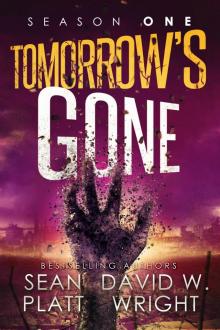 Tomorrow's Gone Season 1
Tomorrow's Gone Season 1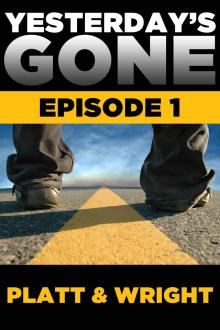 Yesterday's Gone: Episode 1
Yesterday's Gone: Episode 1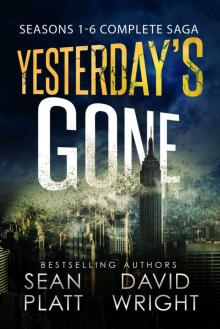 Yesterday's Gone: Seasons 1-6 Complete Saga
Yesterday's Gone: Seasons 1-6 Complete Saga The Beam- The Complete Series
The Beam- The Complete Series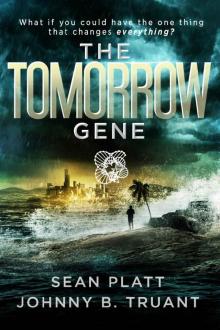 The Tomorrow Gene
The Tomorrow Gene Karma Police: Karma Police Book Two
Karma Police: Karma Police Book Two The Fall (Karma Police Book 5)
The Fall (Karma Police Book 5)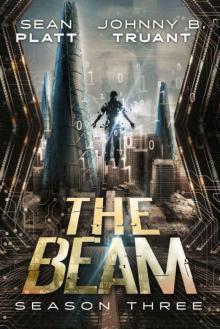 The Beam: Season Three
The Beam: Season Three Resurrection
Resurrection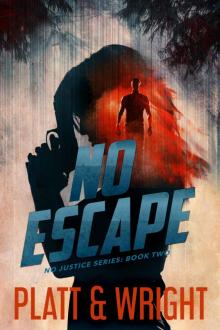 No Escape (No Justice Book 2)
No Escape (No Justice Book 2)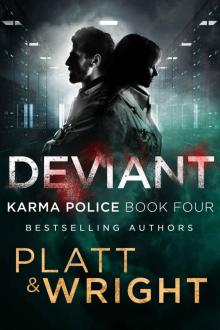 Deviant (Karma Police Book 4)
Deviant (Karma Police Book 4)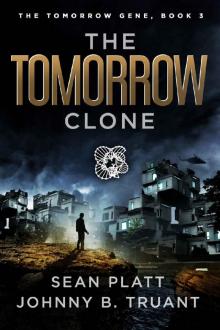 The Tomorrow Clone (The Tomorrow Gene Book 3)
The Tomorrow Clone (The Tomorrow Gene Book 3)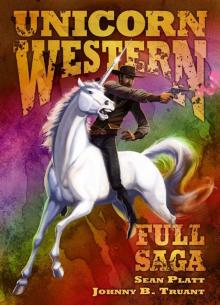 Unicorn Western
Unicorn Western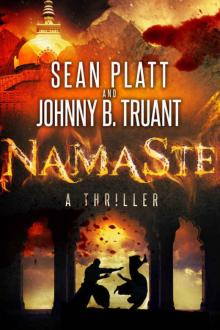 Namaste
Namaste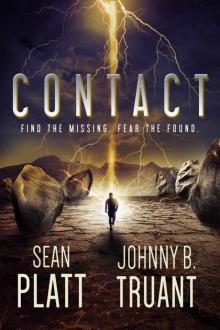 Alien Invasion (Book 2): Contact
Alien Invasion (Book 2): Contact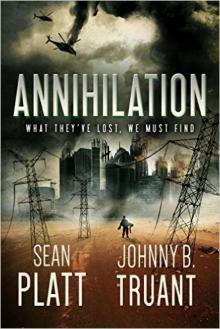 Alien Invasion (Book 4): Annihilation
Alien Invasion (Book 4): Annihilation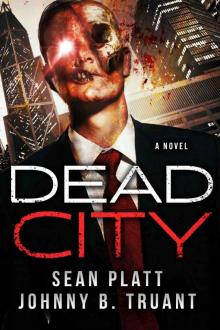 Dead City
Dead City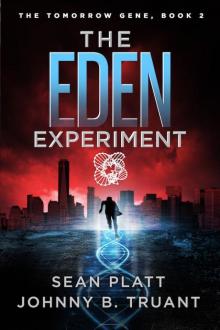 The Eden Experiment
The Eden Experiment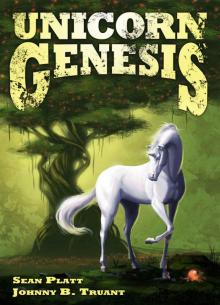 Unicorn Genesis (Unicorn Western)
Unicorn Genesis (Unicorn Western)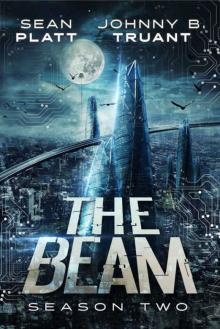 The Beam: Season Two
The Beam: Season Two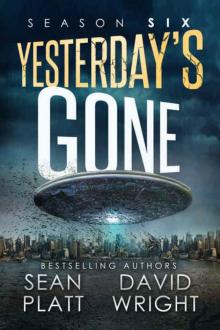 Yesterday's Gone: Season Six
Yesterday's Gone: Season Six Homecoming (Karma Police Book 6)
Homecoming (Karma Police Book 6)![[Alien Invasion 01.0] Invasion Read online](http://i1.bookreadfree.com/i1/03/30/alien_invasion_01_0_invasion_preview.jpg) [Alien Invasion 01.0] Invasion
[Alien Invasion 01.0] Invasion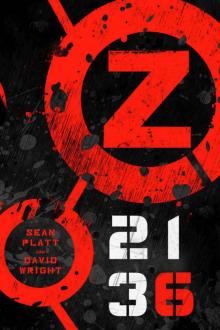 Z 2136 (Z 2134 Series Book 3)
Z 2136 (Z 2134 Series Book 3)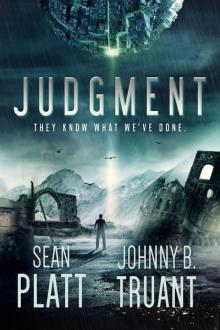 Alien Invasion (Book 5): Judgment
Alien Invasion (Book 5): Judgment Threshold
Threshold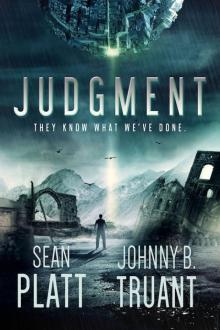 Judgment
Judgment Jumper: Karma Police Book One
Jumper: Karma Police Book One Boricio Goes Camping (Dark Crossings)
Boricio Goes Camping (Dark Crossings)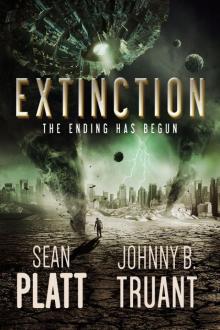 Extinction
Extinction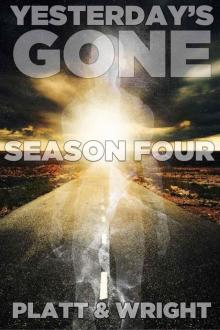 Yesterday's Gone (Season Four): Episodes 19-24
Yesterday's Gone (Season Four): Episodes 19-24![[No Justice 01.0] No Justice Read online](http://i1.bookreadfree.com/i2/04/09/no_justice_01_0_no_justice_preview.jpg) [No Justice 01.0] No Justice
[No Justice 01.0] No Justice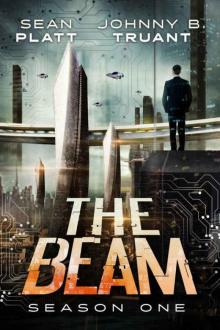 The Beam: Season One
The Beam: Season One La Fleur de Blanc
La Fleur de Blanc The Collectors (Karma Police Book 3)
The Collectors (Karma Police Book 3)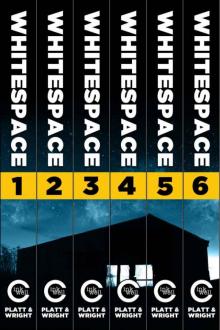 WhiteSpace: Season One (Episodes 1-6 of the sci-fi horror serial)
WhiteSpace: Season One (Episodes 1-6 of the sci-fi horror serial)